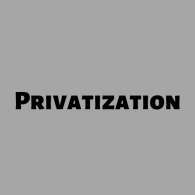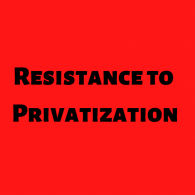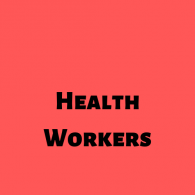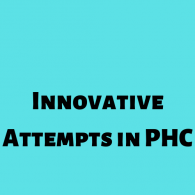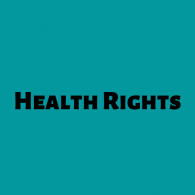Equitable Health Systems
PHM Thematic group on Equitable Health Systems
The Health Systems Thematic Area is one of PHM’s strongest, with broad participation across countries and regions. This thematic circle has a wide-ranging focus, and its work in these broad areas has been divided into six sub-themes: privatisation, resistance to privatisation, corporate watch, innovative attempts in PHC, Health Workers Day, and health rights. Details on subthemes here.
Vision
PHM’s vision for Health Systems is that governments accept their responsibility and keep their commitment to finance and organise health systems that deliver, equitable, good quality health services with decent work, and act on SDoH and ensuring community participation, based on primary health care as defined in the Alma Ata Declaration. The short-term goals range from strengthening activism in country circles, to the impact of activism, to resources and legal victories.
Short-term goals for Advancing Equitable Health Systems
A team of activists and champions for primary healthcare approach and equitable healthcare systems exists in most of our active country circles.
Privatization efforts have failed in many instances due to public pressure related to PHMs activism.
PHM has an accessible public repository of documents on these issues.
Legal victories in more progressive/pro-poor laws and regulations to support comprehensive primary health care and health equity.
For any questions about the thematic circle, please get in touch with <sundar[at]phmovement[dot]org>, <leo.mattos[at]phmovement[dot]org> and <jndasmarinas[at]gmail[dot]com>
RESOURCES AND ARTICLES
Universal Health Coverage & The experience with Publicly Funded Health Insurance (PFHI)
Prof. Dr. Thiagarajan Sundararaman (Sundar)
"Dr. T Sundararaman from PHM was invited by the subcommittee on Global Health of the German Parliamentary to discuss "Universal Health Coverage and the role of health insurance systems". We focused on providing PHM's perspective from a Global South perspective and what the focus on insurance schemes has meant for the Low and Middle Income countries (LMICs). "
I. Important websites to check
- https://www.who.int/
- http://g2h2.org/
- https://hesperian.org/
- Websites for Resources on Access to Medicines- Third World Network, MSF Access Campaign, Health GAP, KEI Europe Blog, KEI Online, Graduate Institute: Knowledge portal on innovation and access to medicines, South Centre: Research papers / Policy briefs / SouthViews, Health GAP: Resources, Milken Institute: Covid-19 treatment and vaccine tracker, Worldometer: Coronavirus pandemic, NYT Coronavirus Tracker, Make Medicine Affordable
II. A selected list of important articles/resources under the following sub themes
III. Covid
- PHM Country statements on Covid Pandemic- https://phmovement.org/statements/
- Pandemic Resilience and Health Preparedeness in India. Sundararaman et al. November 2021.
- Health system’s response to the COVID-19 pandemic in conflict settings: Policy reflections from Palestine. Al Khaldi et al. 2020.
- PHM supported PMAC in organising webinars ahead of the Prince Mahidol Award Conference 2021 on various issues around Covid. The link to all recording of webinars can be found at the PMAC Youtube Page. Details of specific webinar information and links to follow.https://www.youtube.com/channel/UCbtaSjDNoI_kj8rp_gyhT1A/videos
Resources in Spanish prepared by PHM comrades in Latin America.
1) A series of information manuals on prevention and health promotion at the community level in the context of Covid 19. Manual 1, Manual 2, Manual 3. Prepared by the Guatemalan organization ASECSA
2) A power point presentation on context analysis of health systems preparedness and response to the Covid-19 pandemic in the central american region. Prepared by the Guatemalan organization ASECSA3) A position statement of the regional committee for health community health promotion in the context of the Covid-19 pandemic that highlights demands to governments in the central american region.- PHM activists (Fran Baum at al & Lauren Paremoer et al) wrote two of the articles in this BMJ collection “The Road to Equity and Solidarity”. https://www.bmj.com/pmac-2021. January 2021.
- Emerging good practices and lessons learnt to maintain essential health services during the Covid-10 pandemic. Zakoji and Sundararaman. WHO South East Asia Journal of Public Health. February 2021.
- Good public health logistics for resilient health systems during the pandemic: Lessons from Tamil Nadu. Adithyan GS and Sundararaman. Indian Journal of Medical Ethics. April 2021.
IV. Other resources and articles
- “The assessment of the right to health and health care at the country level: A People’s Health Movement Guide”. October 2006.
- This special issue of ‘Saude Em Debate’ focuses on the work of the People’s Health Movement. The special issue is an initiative of Brazilian Centre for Health Studies (Cebes) and Latin American Social Medicine Association as a call for global action for the universal Right to Health. The papers illustrate the links between the local health needs and global political economy and the ways in which health activists are confronting local needs in ways which contribute to building a global movement. Link- http://revista.saudeemdebate.org.br/sed/issue/view/33/v.%2044%2C%20n.%20ESPECIAL%201
- International institutions prescriptions on Primary Health Care- After World Bank’s recent document: WALKING THE TALK: Reimagining Primary Health Care after COVID-19 there was a discussion in PHM that several countries are going through this discussion in Latin America, like Colombia, Chile and others. There’s a broader context and other documents (Astana statement (Also see PHM response here), WHO operational framework on PHC and Lancet Commission on PHC financing and subsequent PHM response) that are pointing toward a ‘new’ primary healthcare, geared towards “purchasing’ services from private sector rather than building strong public systems and ignoring evidence from global south, social movements and alternatives views.
Link to piece on healthcare & ecological crisis: https://www.dailymaverick.co.za/article/2022-06-06-the-new-health-system-we-build-through-the-nhi-must-be-green/
Health market Inquiry: http://www.compcom.co.za/wp-content/uploads/2020/01/Final-Findings-and-recommendations-report-Health-Market-Inquiry.pdf
Special Issue on Financialization and Health shared by Leo and mande by his research group in Brazil. Unfortunately, full text just in Portuguese. Titles and abstracts in English and Spanish, but sometimes with poor translation: http://cadernos.ensp.fiocruz.br/csp/home/volume/39/fasciculo/354
- On completion of 75 years of WHO, the authors trace the journey of the WHO since its inception, differing factors influencing its politics and the changes it need to undergo in current time to make a meaningful and just impact. Imagining alternative paths for WHO 75 years in. Birn et al. 2023


